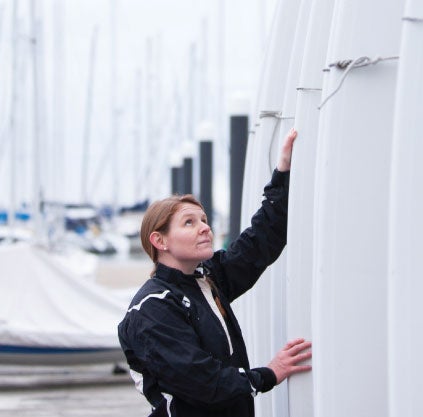 Nearly 10 years after losing her childhood home in one of the costliest and deadliest natural disasters in U.S. history, Clerc Cooper can look back on the terrifying ordeal and see a silver lining.
Nearly 10 years after losing her childhood home in one of the costliest and deadliest natural disasters in U.S. history, Clerc Cooper can look back on the terrifying ordeal and see a silver lining.
It’s a time she remembers well for reasons beside the hurricane. A middle schooler, she’d been sailing competitively in her hometown of New Orleans for most of her life. But by the summer of 2005, her passion for the sport was waning. She wasn’t competing well. Things were off. And she needed a break.
Before she could decide what to do next, however, her world was turned upside down by Hurricane Katrina. When the storm slammed into the Gulf Coast on August 29, 2005, the system of levees designed to protect New Orleans from floodwaters failed catastrophically.
Among the first of the floodwalls to give way to the rushing tide was the 17th Street Canal Levee – along which sat the Cooper family’s newly renovated home. The house was flooded and ransacked by looters and later bulldozed to make way for the rebuilding of a new levee.
When the mandatory evacuation order had come, the family scrambled to grab whatever possessions they could. They thought they would have more time to fortify their home, and so they had spent the day before the evacuation working to secure trophies and other valuables at the nearby yacht club where Cooper was a junior sailor.
The yacht club – the center of Cooper’s sailing universe – was destroyed. The upper portions of the building that didn’t flood caught fire and burned to the waterline.
During the period of soul-searching and reflection that began for so many after the hurricane, Cooper began to understand that “home” is both a place and an ideal. Her family had lost the house they lived in and most of their possessions. But Cooper had another home, and that was on the water, sailing, competing. She was most at peace when pushing her body and mind to conquer opponents and nature.
“When I was younger, I did it because that’s mostly what my family did. We were sailors,” she says. “But as I got older, I was really attracted to the competition.”
And it’s safe to say that Cooper thrives on competition. By the time she was in high school, she had not only returned to sailing, but she was a top honors student, captain of her swim team and a varsity softball player.
At the College, Cooper rose quickly through the ranks, sailing in two-person, or double-handed, boats known as 420s and FJs. She made an immediate impact as a freshman in 2011–12, skippering her boat to impressive finishes in major competitions.
Last spring, as a junior, Cooper was named an All American Honorable Mention. She was also named to the All-Academic sailing team for her academic success and 3.9 GPA. This year, she is the A-Division skipper and the College’s top women’s sailor.
She loves that sailing relies on brawn and brains: “It’s almost like a chess game.” Cooper plays out moves in her head, weighs the pros and cons. But there’s scant time for strategic contemplation in sailing. It’s instinctual and rapid-fire. Quick actions win races.
With sailors competing in both fall and spring seasons, Cooper travels regularly to competitions. Between the rigors of sailing, the demands of the Honors College, a part-time job as a legal assistant and her Delta Gamma sorority duties, she has very little free time. Her idea of rest is squeezing in a quick run to the Battery or baking cookies for friends.
“You won’t find me watching Netflix very often,” says the double major in history and African American studies with a minor in sociology, who is also a member of the Honors College’s William Aiken Fellows Society.
Cooper is as driven in the classroom as she is on the water. And she’s deeply curious about the past and thrives on challenges.
As part of a recent internship with the Jubilee Project, a celebration of the 200th anniversary of the Emancipation Proclamation and the 50th anniversary of desegregation in Charleston, Cooper was tasked with tracking down plaintiffs from a 1963 landmark court case that led to the desegregation of public schools in Charleston. She managed to locate nearly a dozen African American plaintiffs whose important contributions to civil rights had been largely lost to history. Today, their oral histories are preserved in a project archive. The interviews also formed the basis of a book chapter about desegregation in Charleston that Cooper co-authored with teacher education professor Jon Hale. She’s even presented a research paper at an academic conference.
As she looks ahead to graduation this spring, Cooper is making plans for a summer of travel before pursuing her dream of becoming a lawyer. She’s applied to several top-tier law schools. Most are near the water.
Until then, she has unfinished business at the College: her goal of becoming an All American in sailing. It would be a storybook ending to her sailing career – a career that was almost washed away by a hurricane and that perhaps flourished because of it.
– Photo by Kip Bulwinkle ’04




